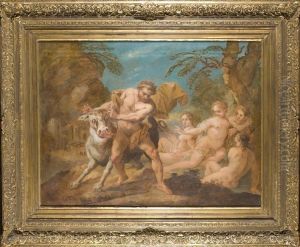Jean Etienne Beauverie Paintings
Jean Etienne Beauverie was a French painter, born in 1874 in Chazelles-sur-Lyon, France. He is known for his landscapes and scenes of rural life, which often reflect the traditions and atmosphere of the French countryside. Beauverie was influenced by the impressionist movement, which is evident in his use of light and color to capture the essence of his subjects.
Beauverie's artistic journey began at a young age under the guidance of his father, who was also an artist. He later moved to Lyon, where he continued his education in the arts. His dedication to his craft led him to Paris, where he was exposed to the thriving art scene and the works of the impressionists, which had a profound effect on his approach to painting.
Throughout his career, Beauverie exhibited his work in various salons and galleries. He gained recognition for his ability to blend traditional landscape painting with the impressionist technique, creating works that were both familiar and innovative. His paintings often depicted the simplicity and beauty of the French countryside, with a particular focus on the changing seasons and the effects of light on the natural environment.
Beauverie's reputation grew as he participated in exhibitions across France and abroad. His works were appreciated for their vibrant color palette, delicate brushwork, and the sense of tranquility they evoked. Despite the influence of impressionism, Beauverie maintained a distinct style that set his work apart from his contemporaries.
Jean Etienne Beauverie's contribution to the art world continued until his death in 1938. His paintings remain a testament to his talent and his love for the French landscape. Today, his works can be found in several museums and private collections, where they continue to be celebrated for their beauty and historical significance.
